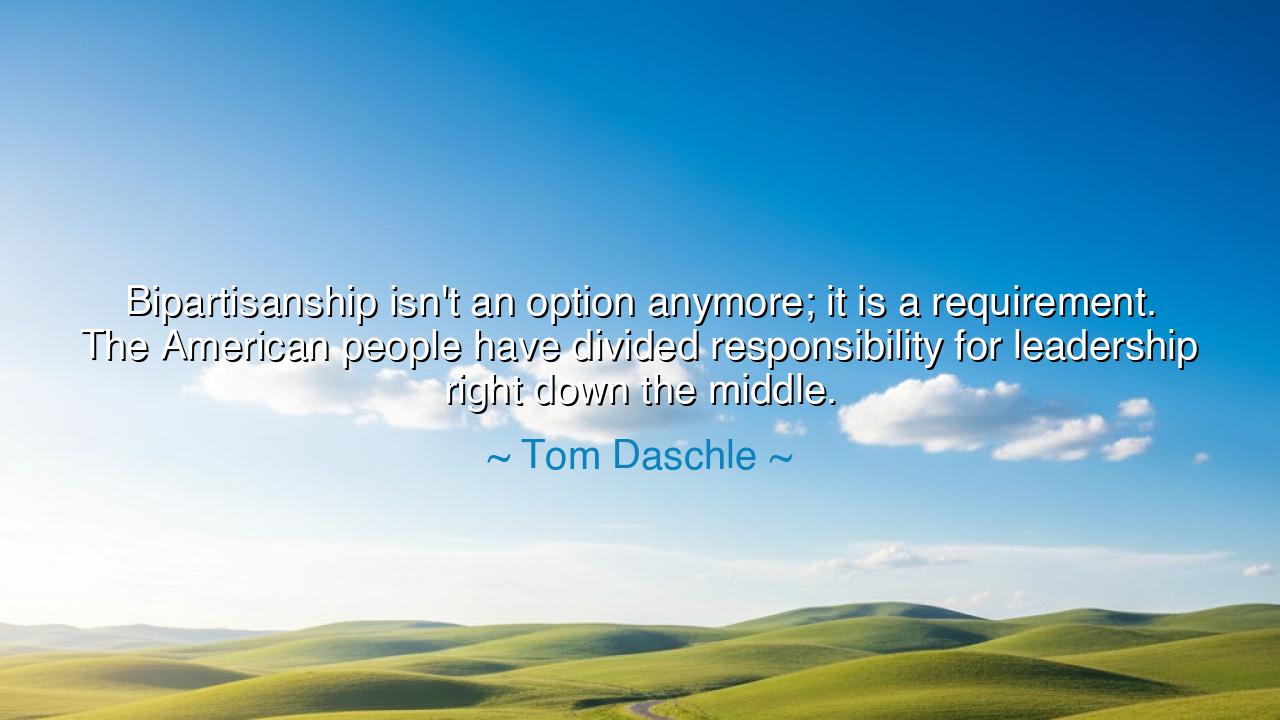
Bipartisanship isn't an option anymore; it is a requirement. The
Bipartisanship isn't an option anymore; it is a requirement. The American people have divided responsibility for leadership right down the middle.






Hear now, O seeker of understanding, the words of Tom Daschle, a statesman of calm vision in a turbulent age: “Bipartisanship isn't an option anymore; it is a requirement. The American people have divided responsibility for leadership right down the middle.” These words, though born of the American political struggle, carry the weight of universal truth — that a house divided cannot stand, and that in times of fracture, unity is not luxury but survival. His statement is a call not merely to politicians, but to all who dwell in the realm of conflict: that when the people themselves are divided, cooperation becomes the highest form of leadership.
The meaning of this quote rests in the recognition of balance — that when power is split equally between opposing sides, governance must transcend rivalry. Daschle, who once stood as Senate Majority Leader, saw with his own eyes a Congress locked in struggle, neither side commanding full strength. In such moments, to insist on victory alone is to ensure mutual defeat. Thus, he declares that bipartisanship, once an act of goodwill, has now become a necessity. When the people’s trust is shared between two visions, it is a message from the nation’s heart itself: work together, or fail together.
The origin of these words lies in a pivotal time in American politics, when Daschle led the Senate during an era of near-perfect division — fifty senators from one party, fifty from another. It was a mirror of the nation’s soul, reflecting deep polarization but also deep interdependence. He spoke not as an idealist detached from reality, but as one forged in it — a man who had seen how obstruction breeds paralysis and how compromise, though difficult, gives life to democracy. His quote thus springs from experience, not theory — from the ancient lesson that shared power demands shared responsibility.
This truth has echoed through history. Consider the Roman Republic, in its final centuries. Once governed by the harmony of its Senate, it descended into chaos when faction overcame cooperation. When leaders such as Caesar and Pompey refused compromise, the republic that had endured for centuries was shattered by ambition. Contrast this with the spirit of Abraham Lincoln, who, though waging war to preserve the Union, filled his cabinet with his rivals, creating what was called “a team of rivals.” In unity of purpose, though not of opinion, Lincoln demonstrated the wisdom Daschle echoes: that strength is born from listening to those who differ from you.
And yet, Daschle’s words are not confined to politics alone. They speak also to families, communities, and nations across the world. For in every sphere of life, when divisions deepen and voices harden, cooperation becomes not a choice but a duty. The American people, he reminds us, “have divided responsibility.” That phrase bears power — it means the people themselves, by their votes and beliefs, have decreed that no one vision shall dominate, that leadership must be shared. Thus, bipartisanship is not a betrayal of conviction; it is the fulfillment of democracy’s deepest law — that the people’s will must be honored in all its variety.
But the quote also carries a warning. When division becomes identity, and dialogue becomes impossible, the pillars of society tremble. The ancients knew this well. In the stories of Greece, when the gods quarreled, storms wrecked the world below. So too in the realm of men: when leaders cling to pride instead of principle, nations falter. Cooperation is not weakness, Daschle reminds us; it is wisdom. To yield on small matters for the sake of a greater good is not to surrender, but to see with the eyes of posterity — to lead not for applause, but for endurance.
Thus, O listener, what lesson shall you draw from these words? It is this: when the world grows divided, let your heart grow wider. When others choose conflict, choose understanding. When you face those who disagree, do not ask, “How can I win?” but “How can we endure together?” For the truest strength is not domination, but harmony in diversity — the ability to bind wounds rather than deepen them.
So remember the wisdom of Tom Daschle: that in a divided world, unity becomes sacred duty. The middle path is not weakness; it is courage. The willingness to listen, to share, to build across difference — that is the mark of a true leader, whether in a nation or a household. For when power is balanced on both sides, and hearts are split by belief, the only way forward is together. And those who learn this truth will carry not just the legacy of peace, but the quiet glory of wisdom that endures beyond every age.






AAdministratorAdministrator
Welcome, honored guests. Please leave a comment, we will respond soon